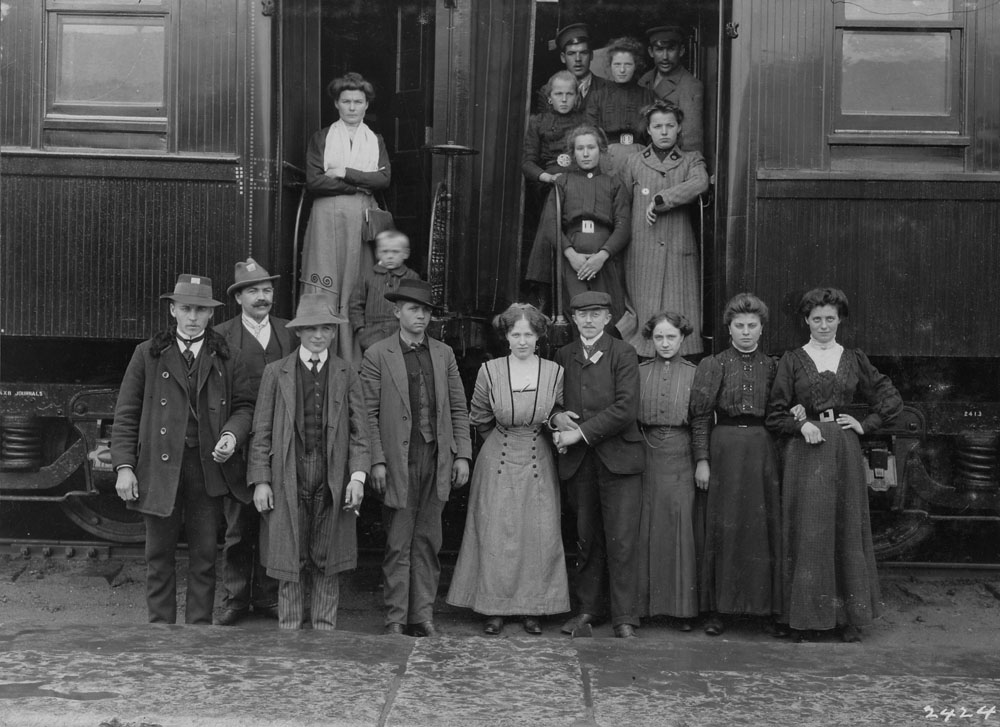Here In the House of Mirrors
Coming to Canada

It took decades to rebuild parts of Europe after the Second World War. Many people left their homeland to come to Canada, leaving their families and loved ones to trek across the Atlantic Ocean by boat. They arrived at ports in Halifax or Quebec.
My parents came to Canada in such a fashion.
Between 1946 and the early 1960s, about 270,000 Germans immigrated to Canada. The Canadian government actively recruited them as workers and future citizens in its effort to shape the Canadian nation as a many-cultured but mostly white European society.
The journey began with a cross-Atlantic boat trip, one that lasted for many uncomfortable days and nights. Sea sickness was prevalent as the boat heaved and bowed to the unpredictable moods of the ocean.
They finally docked in Halifax where they briefly stayed until travelling westward to Toronto.
Thankfully there was a small network of old and new friends who made the journey before my parents did, and they were a blessing with respect to helping them find housing and employment. My parents knew a handful of English words so reuniting with other speakers of their native tongue was a godsend. Especially in a land as vast as Canada. Their preconceived notions of how Canadians lived were quickly dispelled when they settled into a room at a boarding house on Windermere Avenue, in Toronto. Gone were the stereotypes of First Nations people living in tee-pees and smoking peace pipes or cowboys saddling up to go to the nearest saloon. Canada wasn’t the lawless yet romantic frontier that they had envisioned. Instead, they became part of the integrated fabric, aka the melting pot that was made up of citizens from various European nations.
Our immediate neighbours were Scottish, while a couple of doors down lived an Italian family.
A few doors further down resided a Portuguese family. Steps from them a Ukrainian family. We also had families on our street who hailed from Poland, the Czech Republic and England.
My closest friends growing up however, came from Japan, India and Pakistan. We all took turns visiting each others homes after school to help each other with our homework assignments. I excelled at creative subjects such as English but struggled with advanced mathematics—trigonometry, calculus and the like, while some my friends breezed through them with the ease of taking a sip of water.
My father spent over 40 years working at Maple Leaf Foods (then known as Canada Packers), while my mother was a homemaker. As my sister and I grew up, she would eventually find work in a Seniors Residence close to our home.
My father hated every minute of his labor-intensive job, although he plunged through it to provide for his family. There was a very anti-German sentiment which was prevalent at the time. Since the impact of WWII still rippled through various parts of society, it was not surprising that slings and arrows were cast in several directions.
My mother by contrast was a homemaker until my sister and I were old enough to manage ourselves and establish our own sense of independence. As a youth back in Germany, she and my Godmother were quite the Hellraisers, riding around town on a motorcycle and turning every head as a result.
Our family pets ran the gamut from goldfish to gerbils, budgies and eventually a cute miniature dachshund named Cookie. Cookie was an ankle biter, undoubtedly caused by the Napoleon complex that is engrained in the minds of most small dogs.
In their retirement, they enjoyed becoming grandparents and going to seaside resorts in Mexico and the Caribbean. Trips to and from Germany became less frequent, as more places at the dinner table became vacated by those that had departed. And then eventually permanent silence.
My parents had successfully carved out a small, modest space for themselves and their family. And their supper time prayers always ended with the words—
‘Canada……Good country.‘
by Rob Herholz




